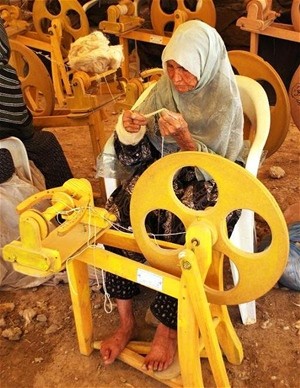Home » Reports & Data » Progress » Transforming Lives » Spinning Wheels Help Women Triple Productivity

An Afghan woman uses a foot-treadle spinning wheel that has boosted her productivity and helped to provide jobs for other local women.
USAID/ASAP
Foot-powered spinning wheels raise the output of an Afghan company, enabling the owner to provide more jobs.
10 DECEMBER 2009 | KABUL, AFGHANISTAN
Mohammad Nabi, the owner of Sadaqat Wool Spinning Co., has almost tripled the number of women he employs to spin wool yarn in the past year. His company’s rapid expansion stems from the introduction of foot-treadle spinning wheels – simple devices that date back seven centuries and are still proving their value today.
Nabi established his company in Kabul two years ago, employing 50 Afghan women who relied on the traditional method of spinning wool by hand. In the hope of easing the women’s workload while increasing their output, Nabi bought electric spinning wheels with motors. Since municipal power was available for only a few hours every day, he ran a diesel generator that required a continuous supply of expensive fuel to power the machines.
To expand Sadaqat’s production capacity while reducing the company’s rising energy costs, USAID provided 120 foot-treadle spinning wheels as well as chairs and temporary shelter. The wooden foot-treadle spinning wheel is powered by the spinner’s foot rather than a motor or the spinner’s hand. The spinner sits and pumps a foot pedal that turns the wheel, leaving both hands free to handle the wool yarn. USAID also provided Sadaqat with training in the use and maintenance of this simple, yet effective, device.
Using the foot-treadle spinning wheels, the women have improved the quality of the wool yarn and more than tripled their production – from 1,200 kg to 4,200 kg each month. “The foot-powered spinning wheel is easier and faster,” said Bibi Sabar, an Afghan woman who has worked at Sadaqat for the past year and a half. “I don’t get tired. I think it’s like driving a car.”
In turn, Sadaqat’s sales have jumped from $1,200 per month to $8,200 per month, allowing the company to increase the number of women employed from 50 to 120. Sadaqat sells its high-quality wool yarn to carpet producers in Kabul and Mazari Sharif, but Nabi is eyeing other markets as well. He hopes to export the wool to India and neighboring countries one day.
“There is a huge difference with the new spinning wheels,” said Nabi. “We are very grateful. Without this support from the United States, we would have been struggling.”







Comment
Make a general inquiry or suggest an improvement.